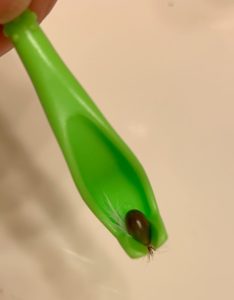
Spring means blooming flowers, growing grass, walking in the woods…. and ticks. And from what I am hearing from my dog friends, they are everywhere this year. We had a mild winter temperature wise, and that means more ticks than normal. So what do you do?
The first thing is speak to your vet about getting your dog on a tick prevention program. A monthly dose of meds goes a long way to protect your dog’s health.
But that does not stop them from getting on your dog and finding their way into your home. Here are some ideas to help you and your dog survive summer.
- Before we walk, I use a spray designed just for dogs. It’s all natural and safe and seems to work well as a repellent. The brand I use is called Wondercide, but there are many brands out there. My dog Pippa is epileptic so I do not use a preventative, just Wondercide and it’s worked well.
- My dogs have very short hair so it is hard for ticks to find a place to burrow and attach. But if your dog has long hair, think about getting a flea comb and get close to the skin with that comb before you enter your car or home.
- Another idea that I’ve seen work well, is go over them with a lint roller before they come inside your home. They stick to the lint roller and you can dispose of them properly.
What do you do it you find a tick embedded on your dog? Despite what you have seen online, putting detergent on them or touching them with a match is not a good idea. They might release from your dog, but as they do, they regurgitate all the bacteria…. Into your dog.
The proper way to remove a tick is to grab them by the head and pull them out…. gently. I picked up a little tool called a tick puller at the pet store and I’ve only had to use it once, and it worked. So I highly recommend picking up one the next time you get dog food.
Ticks are tiny and hard to see. One night, I was laying in bed and felt something on my leg. And it was a tick. Easy to see on my white sheets, but not so easy to see on a black dog. For your health and safety, it’s important to stay diligent. And if you do, you and your dog should be safe this summer.







